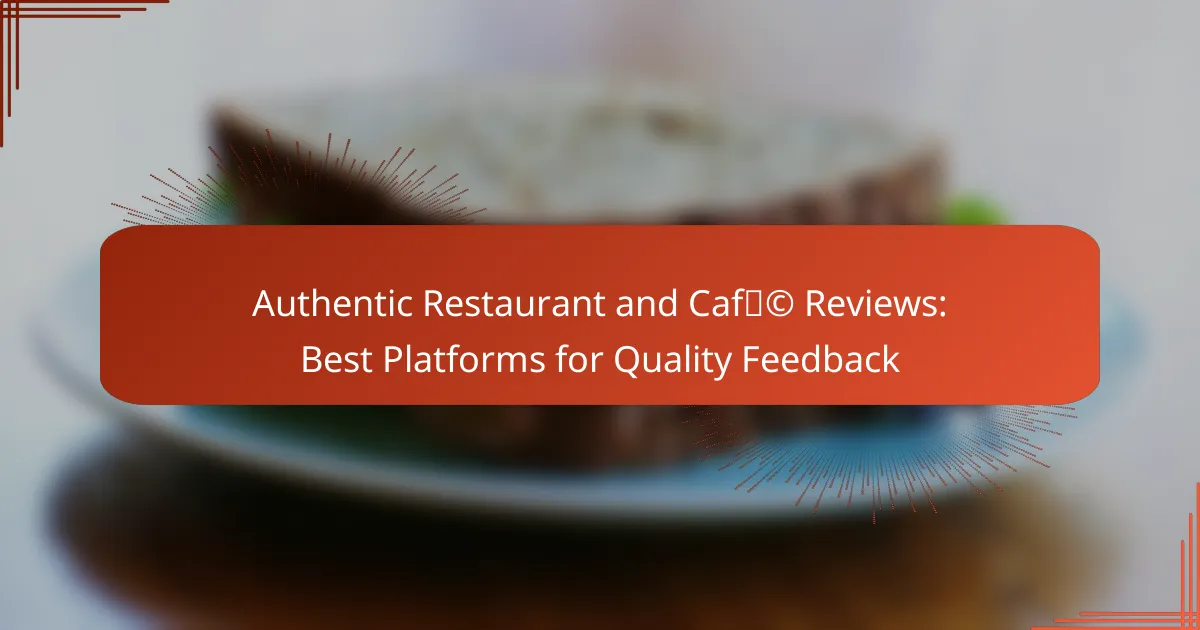In the digital age, café review platforms like Yelp, Google Reviews, and Tripadvisor play a crucial role in shaping the dining experience. They offer valuable insights for both café owners and customers, enhancing visibility and fostering engagement. However, users should also be aware of potential drawbacks, such as the impact of negative reviews and the challenges of misinformation. Understanding the pros and cons of these platforms can help users make informed decisions when choosing where to dine.

Which café review platforms are the best?
The best café review platforms include Yelp, Google Reviews, Tripadvisor, Facebook, and Zomato. Each platform offers unique features and user bases, making them suitable for different types of café-goers and business owners.
Yelp
Yelp is a popular platform known for its extensive user-generated reviews and ratings. It allows customers to share their experiences, photos, and tips about cafés, making it a valuable resource for potential visitors.
When using Yelp, businesses can claim their listings to respond to reviews and update information. However, negative reviews can significantly impact a café’s reputation, so it’s crucial to engage with customers positively.
Google Reviews
Google Reviews is integrated with Google Maps, making it easy for users to find cafés while searching for nearby options. Reviews appear directly in search results, enhancing visibility for businesses.
Cafés should encourage satisfied customers to leave positive reviews, as higher ratings can improve search rankings. It’s important to monitor and respond to feedback to maintain a good online presence.
Tripadvisor
Tripadvisor is well-known for travel-related reviews, including cafés. It offers detailed insights, including ratings, photos, and user comments, which can help travelers discover local favorites.
Cafés listed on Tripadvisor can benefit from increased exposure to tourists. However, businesses should be aware that the platform’s audience often expects high standards, so maintaining quality is essential.
Facebook allows cafés to create business pages where they can interact with customers and share updates. Reviews on Facebook can influence potential visitors, as friends’ recommendations carry weight.
Engaging with customers through posts and responding to reviews can enhance a café’s community presence. However, businesses should be cautious of public feedback, as negative comments can spread quickly.
Zomato
Zomato specializes in food and restaurant reviews, making it a great platform for cafés to showcase their menus and ambiance. Users can find detailed reviews, photos, and ratings specific to food and drinks.
Cafés can use Zomato to attract food enthusiasts, but they should ensure their listings are accurate and up-to-date. Engaging with reviewers can help build a loyal customer base and improve overall ratings.

What are the pros of using café review platforms?
Café review platforms offer significant advantages for both café owners and customers. They enhance visibility, foster customer engagement, and provide access to valuable user-generated content that can influence potential patrons.
Increased visibility for cafés
Using café review platforms can dramatically increase a café’s visibility among potential customers. When cafés are listed on popular platforms, they can reach a wider audience, especially those searching for dining options in their area.
For instance, a café that actively engages with review platforms can appear in search results more frequently, potentially attracting new customers. This visibility can translate to increased foot traffic and higher sales, particularly in competitive markets.
Customer engagement opportunities
Café review platforms provide unique opportunities for customer engagement. Owners can respond to reviews, both positive and negative, which helps build relationships with patrons and demonstrate commitment to customer satisfaction.
Engaging with customers through these platforms can encourage repeat visits and foster loyalty. For example, responding to a positive review with a thank you or addressing a concern in a negative review can showcase a café’s dedication to service and improvement.
Access to user-generated content
User-generated content on café review platforms serves as authentic testimonials that can influence potential customers. Reviews, photos, and ratings from real patrons provide insights into the café’s offerings and atmosphere.
This content can be leveraged in marketing strategies, such as sharing positive reviews on social media or using customer photos in promotional materials. Additionally, analyzing feedback can help café owners identify areas for improvement and adapt their services to meet customer expectations.

What are the cons of using café review platforms?
Café review platforms can present several drawbacks that users should consider. These include the potential for negative reviews, challenges in managing false information, and dependence on platform algorithms that can affect visibility and credibility.
Potential for negative reviews
Negative reviews can significantly impact a café’s reputation and customer perception. A single unfavorable comment can deter potential customers, especially if it is prominently displayed. It’s essential for café owners to actively manage their online presence and respond to criticism constructively.
For instance, a café with a few negative reviews among many positive ones may still attract customers, but a pattern of negative feedback can lead to a decline in business. Regularly monitoring reviews and addressing concerns can help mitigate this risk.
Management of false information
False information can spread quickly on café review platforms, leading to misunderstandings about a café’s offerings or quality. This misinformation can stem from disgruntled customers or even competitors looking to harm a business’s reputation. Addressing inaccuracies promptly is crucial.
Café owners should claim their business profiles on these platforms to have the ability to correct any misleading information. Encouraging satisfied customers to leave positive reviews can also help overshadow any false claims.
Dependence on platform algorithms
Café review platforms often use algorithms to determine which reviews are highlighted, which can affect a café’s visibility. These algorithms may favor newer reviews or those with higher engagement, potentially sidelining older but still relevant feedback. This can create an uneven playing field for cafés.
To navigate this, café owners should encourage patrons to leave reviews regularly and engage with their audience on the platform. Understanding how the platform’s algorithm works can help in strategizing for better visibility and customer engagement.

How do café review platforms compare?
Café review platforms vary in user engagement, features, and audience reach, impacting how cafés are perceived. Understanding these differences helps café owners and patrons choose the right platform for their needs.
Yelp vs Google Reviews
Yelp and Google Reviews are two of the most popular café review platforms, each with unique strengths. Yelp is known for its detailed reviews and strong community engagement, while Google Reviews benefits from integration with Google Maps, making it easier for users to find cafés while searching online.
When choosing between them, consider that Yelp often attracts a more dedicated food enthusiast audience, whereas Google Reviews reaches a broader demographic. For café owners, maintaining an active presence on both can maximize visibility and customer engagement.
Tripadvisor vs Zomato
Tripadvisor and Zomato cater to different types of users and experiences. Tripadvisor is widely recognized for travel-related reviews, making it ideal for cafés that attract tourists. Zomato, on the other hand, focuses on local dining experiences and offers extensive menus and photos, appealing to regular patrons.
Cafés should leverage Tripadvisor to reach international visitors, while Zomato can help engage local customers. Regularly updating profiles on both platforms can enhance visibility and attract diverse clientele.
Facebook vs Yelp
Facebook and Yelp serve different purposes in the café review landscape. Facebook is primarily a social platform that allows cafés to build community and engage with customers through posts and events, while Yelp specializes in detailed reviews and ratings.
Cafés can benefit from using both platforms; Facebook can foster customer loyalty and interaction, while Yelp can drive new customers through its review system. It’s essential to respond to reviews on both platforms to maintain a positive reputation and encourage customer feedback.

What criteria should I consider when choosing a café review platform?
When selecting a café review platform, consider user demographics, features, and social media integration. These factors will help you identify a platform that aligns with your needs and reaches your target audience effectively.
User base demographics
Understanding the user base demographics of a café review platform is crucial for effective marketing. Look for platforms that cater to your target audience, whether they are young professionals, families, or tourists. For instance, platforms popular among millennials may focus on trendy cafes, while those favored by families might highlight kid-friendly options.
Check the geographical distribution of users as well. Some platforms may have a stronger presence in urban areas, while others might be more popular in suburban or rural settings. This can affect the visibility of your café among potential customers.
Features and functionalities
Evaluate the features and functionalities offered by each café review platform. Essential features include user-generated reviews, ratings, photo uploads, and search filters. Some platforms may also provide advanced functionalities like reservation systems or loyalty programs, which can enhance customer engagement.
Consider the ease of use for both café owners and customers. A user-friendly interface can encourage more reviews and interactions, while complex navigation might deter potential users. Look for platforms that allow you to respond to reviews and manage your café’s profile effectively.
Integration with social media
Social media integration is a key factor in maximizing your café’s exposure. Platforms that allow users to share reviews and photos directly to social media can significantly increase visibility. Look for options that facilitate easy sharing on popular networks like Instagram and Facebook.
Additionally, consider how well the review platform integrates with your own social media marketing efforts. Some platforms offer tools for cross-promotion, enabling you to leverage user-generated content to attract more customers. This synergy can enhance your café’s online presence and drive foot traffic.



